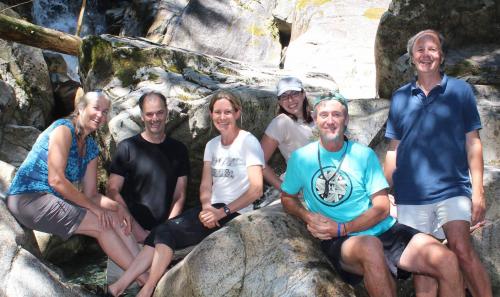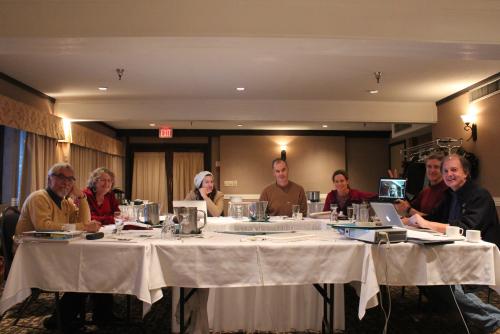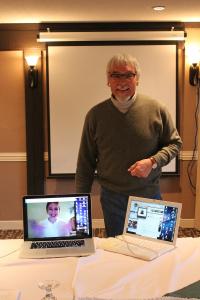Over the past few months, the IPinCH Steering Committee has been working hard to establish priorities and to make and implement plans for the remaining years of the project.
This work, coordinated by an ad-hoc ‘Priorities + Planning’ committee, began in earnest at the Steering Committee retreat in August and continued through the fall, culminating in a two-day planning meeting held in Vancouver November 30 and December 1. The priorities and plans described below summarize the outcome of these efforts to date, which draws on input received from a wide range of team members.
The Steering Committee all agreed on the need to limit the scope of the project in order to maximize our effectiveness and outcomes. Recognizing that the project’s primary contributions are in the realm of academia, the following were identified as key priorities:

• To understand and support ethical and equitable research processes and outcomes;
• To identify issues related to ownership and control of cultural heritage research data and to identify ways to address these issues constructively for all parties involved;
• To understand relationships between intellectual property and cultural heritage embedded in different disciplinary traditions and cultural perspectives, and to communicate this to stakeholders and the public;
• To facilitate and share recommended practices for the identification, assessment, protection, and appropriate use of intellectual property in cultural heritage;
• To raise awareness of issues and provide evidence-based policy recommendations to funding agencies, research ethics review boards, and national research ethics policy bodies concerned with intellectual property in cultural heritage research and stewardship;
• To support networks of those engaged in community-based cultural heritage research as a way to share information and recommendations on intellectual property issues in cultural heritage; and
• To act on the above priorities in ways that contribute to measurable changes to the culture of academic research.
 Making plans for project activities involves a combination of providing support for initiatives brought forward by team members and partners, and mapping out larger events and programs that will address project priorities and further broad project goals. Wherever possible, for example, we will continue to support initiatives proposed by Working Groups and Case Studies. We will also continue our commitment to student support through fellowships, travel funding, and research assistantships, and by providing opportunities for students to be involved in all aspects of the project.
Making plans for project activities involves a combination of providing support for initiatives brought forward by team members and partners, and mapping out larger events and programs that will address project priorities and further broad project goals. Wherever possible, for example, we will continue to support initiatives proposed by Working Groups and Case Studies. We will also continue our commitment to student support through fellowships, travel funding, and research assistantships, and by providing opportunities for students to be involved in all aspects of the project.
In terms of larger project events, we plan to support a Case Study Research Workshop to bring team members involved in case studies and community-based initiatives together to share their findings with each other and to work towards making their studies more accessible to broader audiences. Tentative plans are to hold this workshop in mid-March 2014.
We are also working towards development of a national forum focused on research ethics, with a particular focus on the Canadian policy context. The idea here is to bring attention to research ethics at a number of levels—community, institution, and national policy—with a particular focus on issues of intellectual property and cultural heritage. Though still early in the development stage, this event may be scheduled for sometime in 2014.
The third project event under development is an international conference focused on IPinCH themes. This conference would bring together team members from across the globe, along with others involved in intellectual property in cultural heritage work, to share concerns, successes, and latest research findings in this area. Scheduled for late 2014 or early 2015, this would also serve as fitting wrap-up event for the IPinCH project.
In addition to these events, we are developing a number of smaller initiatives to address community and scholarly needs in this area. These include scholarly publications, communication tools targeted to non-academic audiences (including podcasts and videos), and support for participation in smaller workshops and meetings.
We are still in the early stages of developing new initiatives and there is plenty of scope for more input and involvement by all team members. Indeed, we are always looking for more ideas and helping hands. We also encourage you to read a fuller description of project priorities and plans, that will be posted on the IPinCH website.
Top: Joe Watkins connects with Kristen Dobbin, IPinCH Communications Specialist, based in Tartu, Estonia and SC Member Julie Hollowell, in Indiana, via Skype.
Middle: Steering committee members at the IPinCH summer retreat, L-R, Julie Hollowell, Brian Egan, Kelly Bannister, Sarah Carr-Locke, John Welch, and George Nicholas.
Bottom: L-R, Joe Watkins, Cathy Bell, Alexis Bunten, Brian Egan, Kelly Bannister, John Welch, Julie Hollowell (via Skype) and George Nicholas at the Fall Planning Meeting.






